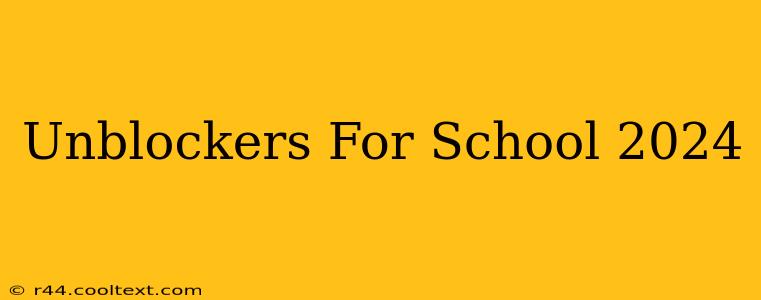School network restrictions can be incredibly frustrating, limiting access to websites and resources you need for research, communication, or even just a quick break. This guide explores the world of school unblockers in 2024, offering insights into their functionality, limitations, and safer alternatives. We'll also discuss the ethical considerations and potential consequences of using these tools.
Understanding School Network Restrictions
Before diving into unblockers, it's crucial to understand why schools implement these restrictions. Schools typically use firewalls and content filters to:
- Protect students: Blocking inappropriate content like violence, hate speech, and adult material is a primary concern.
- Ensure online safety: Filters help prevent access to malicious websites and phishing scams.
- Maintain productivity: Limiting access to distracting websites helps students focus on learning.
- Comply with regulations: Schools often have legal obligations to monitor and filter internet access.
Types of School Unblockers
Several methods claim to bypass school internet filters. However, it's crucial to approach these with caution and awareness of potential risks. Some common approaches include:
1. VPNs (Virtual Private Networks):
VPNs mask your IP address, making it appear as though you're browsing from a different location. While some VPNs can bypass school filters, many schools actively block VPN traffic. Using a VPN without permission might violate school policies and lead to disciplinary actions. Always check your school's Acceptable Use Policy (AUP) before considering this option.
2. Proxy Servers:
Proxy servers act as intermediaries between your computer and the internet. Like VPNs, they can mask your IP address, but they are generally less secure. Schools often detect and block proxy servers as well.
3. Web Proxy Websites:
These websites claim to unblock websites by routing your traffic through their servers. However, these sites can be unreliable, slow, and potentially expose you to malware or tracking. Use them with extreme caution.
4. Tor Browser:
Tor is a privacy-focused browser that routes your traffic through multiple servers, making it more difficult to trace. While it offers strong privacy protections, it's significantly slower than regular browsers and may not bypass all school filters. Moreover, its anonymity features may be misused, making it crucial to use responsibly.
Safer Alternatives and Ethical Considerations
Instead of relying on potentially risky unblockers, consider these safer alternatives:
- Communicate with your school: If a website you need is blocked, politely inquire with your teacher or IT department about accessing it. They might be able to grant you permission or provide an alternative.
- Use school-approved resources: Schools typically provide access to a range of educational resources that are already unblocked.
- Schedule your personal time wisely: If you need to access specific sites for personal reasons, plan to do so outside of school hours.
Using unblockers without permission can have serious consequences, including:
- Suspension from school: Violating school policies can lead to disciplinary actions.
- Account restrictions: Your school network account might be suspended or restricted.
- Legal repercussions: In some cases, bypassing school filters might have legal implications.
Conclusion: Prioritize Safety and Responsibility
While the temptation to bypass school restrictions is understandable, prioritizing safety and responsibility is crucial. Understanding the risks involved and exploring safer alternatives is essential for both your academic success and your online security. Always remember to adhere to your school's AUP and respect its regulations. Open communication with school authorities is the most effective and ethical approach to resolving any issues with internet access.

